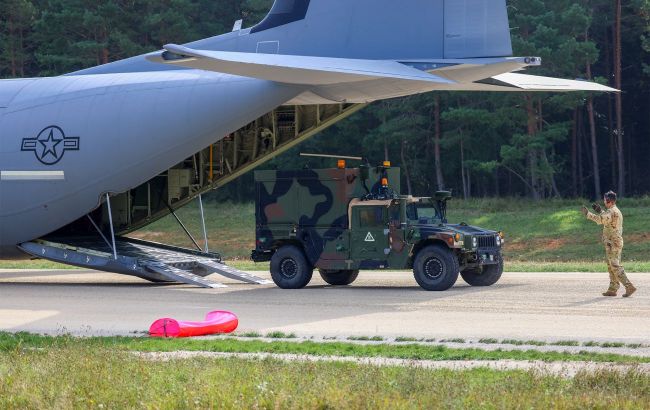Ukraine loses $770 million on undelivered arms - Financial Times
 Photo: Arms dealers failed to deliver $770 million worth of weapons to Ukraine (Getty Images)
Photo: Arms dealers failed to deliver $770 million worth of weapons to Ukraine (Getty Images)
Kyiv has paid foreign arms intermediaries hundreds of millions of dollars for the supply of vital military equipment. Some of the money has been wasted over the past three years of war, Financial Times (FT) reports.
According to the media outlet, Russia's 2022 invasion of Ukraine marked the largest arms procurement rush in Europe since World War II.
While Ukraine's NATO allies supplied vast amounts of military aid, the country’s authorities were also forced to find ways to supply troops fighting along a 1,000-kilometer frontline.
Non-performing contracts and nonexistent deliveries
The Financial Times investigation is based on leaked Ukrainian state documents, court records, and dozens of interviews with procurement officials, arms dealers, and manufacturers, as well as investigators.
In several cases, Kyiv paid large sums in advance to little-known companies for materials that have yet to arrive.
In other cases, officials say weapons sold at heavily inflated prices arrived in unusable condition.
To date, Ukraine has paid $770 million in advance to foreign arms traders for weapons and ammunition that have not been delivered, according to Ukraine's Ministry of Defense and documents reviewed by the FT. This represents a significant share of Ukraine's annual weapons budget of $6–8 billion, funded from its own state resources since the invasion began.
Corruption risks and internal disputes
At the same time, some foreign arms companies claim they became victims of internal feuds and corruption by Ukrainian officials and state-owned arms intermediaries, which may explain some of the missing millions.
Kyiv's government is attempting to restore order. Several former Ukrainian arms procurement officials involved in these deals were dismissed by President Volodymyr Zelenskyy's administration; some have been charged with corruption, and dozens of arms supply contracts are currently under investigation by national law enforcement.
Other deals are stuck in painfully slow arbitration proceedings in places like London and Geneva.
Intermediaries helped, but not always effectively
Several high-ranking former Ukrainian officials who oversaw arms procurement during the first three years of the war defended the use of foreign intermediaries, saying they helped make critical and sensitive arms deals at a time when the country needed to buy large volumes of ammunition produced by nations that, due to geopolitical reasons, did not want to be seen supplying weapons directly to Ukraine.
This shadowy procurement process may have helped Ukraine continue its war effort, but it also meant dealing with foreign entrepreneurs whose alliances may have been purely profit-driven and offered little real value.
"Arms dealers are merchants of death," said Oleksii Reznikov, Ukraine’s Defense Minister until 2023. "They are absolutely pragmatic and cynical. They have no concept of fairness. These concepts don't exist in their world. They say, 'I have it in stock. If you want it, buy it. If you don’t, I’ll sell it to your enemy.'"
Urgent search for weapons and ammunition shortages
As the article notes, within weeks of Vladimir Putin's invasion in early 2022, officials in Kyiv realized Ukraine had only two months' worth of ammunition left.
As the country struggled to survive, the government suspended standard arms procurement rules, and civil servants were tasked with sourcing Soviet-style military equipment from outside NATO countries, wherever possible.
The sudden scramble to source weapons for a positional war, one Western manufacturer had long ceased to prioritize, caused demand to vastly outstrip supply.
According to Reznikov, in 2022, Europe's annual production of shells compatible with Soviet-style artillery totaled just 600,000 units. That would have lasted only a month of combat, and it still amounted to just one-third of the 1.8 million shells Russia was firing monthly.
Rising prices and efforts to recover funds
For a group of foreign arms dealers, nearly all of whom are Americans or Europeans, Ukraine's desperation became an opportunity. At least 10 sources connected to Ukraine's defense procurement or to arms traders pointed to a fourfold increase in the price of Soviet-caliber ammunition in the first half of 2022.
Ukraine's Ministry of Defense says it is pursuing $309 million in court for advance payments made to foreign suppliers under contracts that are no longer considered viable.
It hopes to recover the remaining amount, about $460 million, through pretrial negotiations with the suppliers.
In 2025 budget includes more than 2.2 trillion hryvnias, earmarked for Ukraine's Defense Forces.
In 2025, Ukraine may revise its state budget again to account for rising war-related expenditures. This could happen in the second half of the year.

